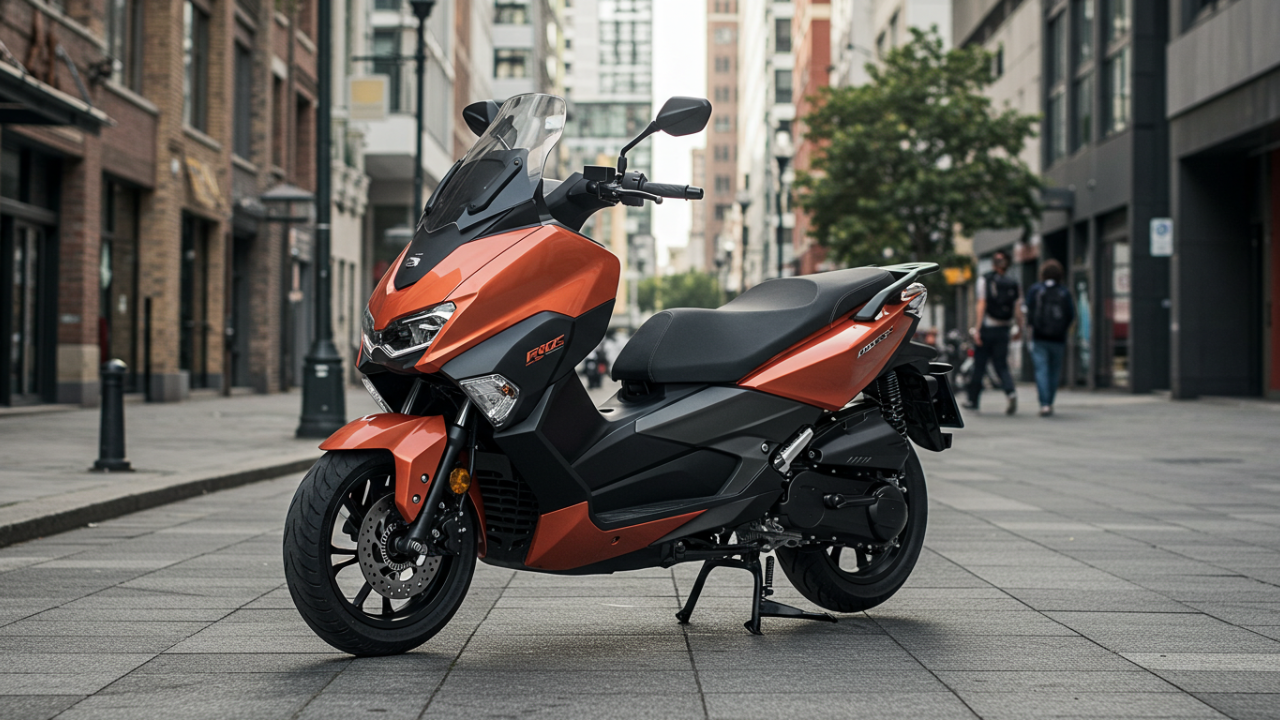In the past, gas scooters were a favorite amongst many users because of their affordability and efficiency. Nowadays, electric scooters have gotten more traction. This makes one question, “should I still purchase a gas scooter in 2025?”. In this article, we’ll discuss the benefits and drawbacks of gas scooters, compare them with other options, and determine if purchasing a gas scooter is still beneficial this year .
What Are Gas Scooters?
Let’s dive into the definition of the product before we compare it to something else:
Definition of Gas Scooters
Gas scooters are two-wheeled vehicles powered by an internal combustion engine that runs on gasoline. They are usually lighter than motorcycles and take up less space. Similar to gas scooters, electric scooters also need some sort of power. The only difference is that gas scooters require fuel while electric scooters work with batteries.
Key Features of Gas Scooters
-
Engine: Gas scooters come with a combustion engine but the power differs from one scooter to the other. Typically, scooters range from 50cc to 250cc. The scooters also rely on gas.
-
Fuel System: Every appliance has its pros and cons and gas scooters are no different. The good thing is that with the help of this article, you can finally decide whether or not to purchase a gas scooter.
-
Exhaust System: Unlike other two-wheeled vehicles, gas scooters also entail the burning of fuel, which produces exhaust gas, further adding to congestion and air pollution.
The History and Popularity of Gas Scooters
Why Gas Scooters Became Popular
In the past gas scooters were popularly accepted as a far more efficient and cheaper option than cars. This trend was especially common in gas scooters were praised for their:
-
Fuel efficiency: When compared to super-sized vehicles, gas scooters burn a lot less fuel, which makes riding them economical.
-
Affordable pricing: In comparison to motorcycle or cars, gas scooters have a lot lower purchasing and servicing cost.
-
Compact size: Their relatively small size makes them the perfect scooters for urban settings, where users can easily avoid traffic and locate parking spots.
Attending less developed societies is more like a lifestyle rather than an option and gas scooters are an everyday vehicle with relatively little maintenance, self-driven and uncomplicated transport.
The Rise of Electric Scooters
Electric Scooters in 2025
There has been an increase in the use of electric scooters in the past few years. Electric scooters can be considered to be a more environmentally friendly option as they are battery-powered compared to gas-powered scooters. With the progress in battery technology and growing interest in eco-friendly options, these scooters are expected to gain even more popularity by 2025.
Key Advantages of Electric Scooters
-
Zero Emissions: Electric scooters have an upper hand over gas scooters as they do not emit any harmful chemicals that could be dangerous for the environment.
-
Lower Maintenance Costs: With fewer moving parts, electric scooters are easier to maintain, as no oil changes or gas engine maintenance is needed.
-
Quieter Operation: Riding an electric scooter provides a calmer experience as they are much quieter than gas powered scooters.
-
Convenient Charging: Home electric charging devices enable subsidized gas station trips.
Electric vs. Gas Scooters: A Comparison
Let’s dive into and analyze the most important aspects that differentiate gas from electric scooters.
Range: Gas scooters outperform electric scooters in terms of range, however, the latter has shown significant improvement in range due to advancements in tech and increased options fulfilling most commuting needs.
Cost: Fuel-based scooters usually cost less than electric scooters, both in upfront and purchase costs. However, they have ongoing costs for fuel and maintenance. Electric scooters have higher cost than gas scooters, but are cheaper to maintain and operate.
Performance: Gas scooters are powerful and able to handle longer trips and steeper terrain. They tend to perform better than electric scooter which are suited for city commutes because they operate smoother and quieter.
Are Gas Scooters Still Worth Buying in 2025?
Due to the rising popularity of electric scooters, many people wonder if gas scooters are still worth it in 2025. Let’s take a look at what the factors are to simplify your buying decision.
1. Commute Distance
For those with long daily commutes, the range offered by gas scooters might be ideal. Most gas scooters have a range of 100-200 miles on a single tank of gas. While a majority of electric scooters come with a range of 30-60 miles, some newer models are pushing this limit.
If you are looking for a scooter that can handle longer distances without needing a lot of charging breaks, gas scooters are still better.
2. Refueling Convenience
A benefit that gas scooters have over electric is how quickly they can refuel. Fuel stations are present in most locations, and the refueling process is very quick, taking only a few minutes.
However, electric scooters take a longer time to charge, with the charging duration being hours depending on the battery size and charger type. Additionally, gas scooters have more convenience in functionality, especially in areas where charging infrastructure is lacking.
3. Budget Considerations
The price of entry for a gas scooter is typically lower than that of an electric scooter, especially for the lower-end models. On the other hand, gas scooters require more ongoing costs in fuelling, oil changes and general maintenance.
Electric scooters, on the other hand, have much lower operational costs when it comes to charging and maintaining the device. In essence, the deciding factor will be dependent on one’s budget, whether they prefer a lower initial investment, or long-term financial savings.
4. Maintenance and Durability
Electric scooters have an inherent advantage over gas scooters in the category of maintenance. Unlike gas scooters, electric ones do not require oil changes, spark plug replacements, and carburetor cleanings. Over time, this can add up, making electric scooters a better option for low-maintenance rides.
Moreover, with such a lower amount of moving parts, the electric scooter becomes easier to maintain and less susceptible to mechanical breakdowns.
5. Environmental Concerns
Gas-powered scooters may not be the best option with regard to environmental sustainability due to their emissions and contribution to air pollution and climate change. Electric scooters, on the other hand, have zero emissions and are a cleaner alternative. With the growing concern regarding climate change, it is possible that many consumers may take this into consideration.
Pros of Gas Scooters in 2025
1. Longer Range
Gas scooters have better range and can outlast many electric scooters on a single tank of gasoline. This makes gas scooters perfect for individuals who need to travel long distances on a daily basis.
2. Fast Refueling
Gas scooters can be refueled within minutes, making them more convenient than electric scooters which require several hours of charging. For people who frequently use scooters or are on a tight schedule, gas scooters are the better choice.
3. More Power for Tough Terrain
Gas scooters tend to be more powerful than electric scooters, making them better suited for steep hills and rougher terrain. If you live in an area with many inclines, a gas scooter would perform significantly better.
4. Lower Initial Cost
If you refer to gas scooters, you might find that they are cheaper than electric models, especially for budget-oriented consumers. A gas scooter is a worthwhile investment if one is looking for affordable transport.
You can also read How far can an electric scooter go in 2025?
Cons of Gas Scooters in 2025
1. Environmental Impact
Gas scooters release a range of harmful substances, including carbon dioxide (CO2), nitrogen oxides (NOx), and even particulate matter. This further damages the air we breathe, while also accelerating global warming gases. Their careless use is a step backwards for our world during these times when one is battling for sustained growth and development.
2. Maintenance Costs
Gas scooters are not the cheapest mode of transport due to the amount of maintenance one needs to do on them. It includes oil changes and spark plug replacements, not to forget the cost of maintenance themselves. Electric scooters, in comparison, require far less effort and are far easier on the budget in the long run as well.
3. Noise and Vibration
Gas scooters are comparatively much noisier and vibrate far more than electric scooters. The noise from the gas engine is irritating and vibrations also do not help, especially in urban environments where peace and quiet is both desired and needed.
4. Declining Market
The market for gas scooters has begun to decline as electric opciones are everywhere. From being considered the latest fad to becoming a necessity in today’s advanced world, they have become more sought after. The decreased production of gas scooters translates into increased difficulty finding replacement parts in the near future.
My Opinion
Should we consider the gas scooter a worthwhile investment in 2025? This answer varies with a person’s individual preferences. For those with unique specific needs like longer range, faster refueling, and lower upfront investment, gas scooters may be a good fit. On the other hand, for people concerned with the environment, future costs, and maintenance, an electric scooter would be a better buy.
At the end of the day, the individual’s daily travel needs, budget, and what they value the most takes precedence. With gas scooters becoming less energy efficient and accessible, this would most likely be the case in the future.

